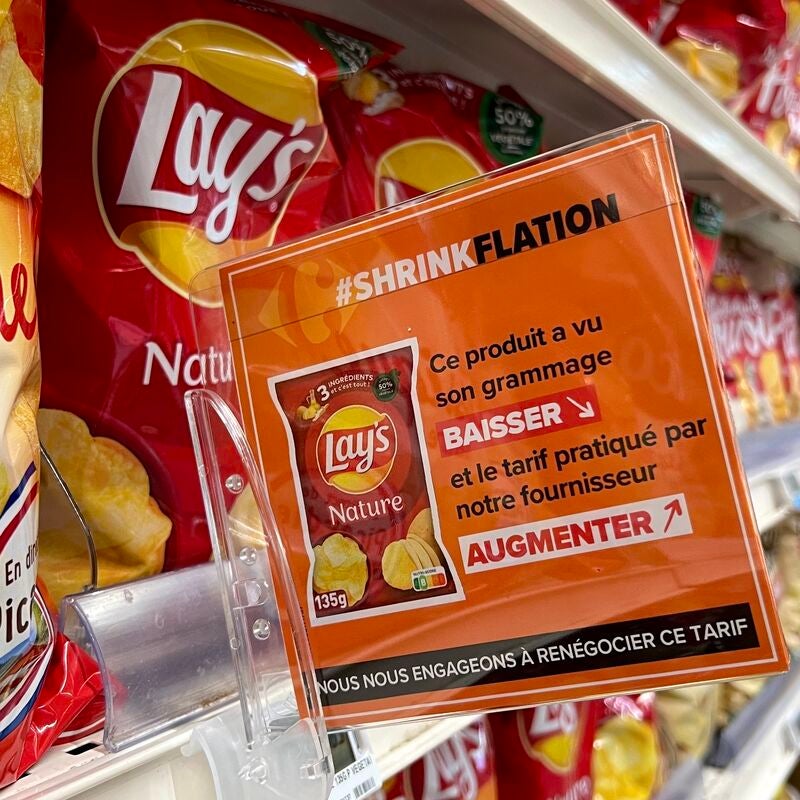
Carrefour has affixed “shrinkflation” signs onto store shelves to point the finger at brands they say are reducing the size of packets but not prices.
A pictorial posted on Carrefour’s LinkedIn page shows a laminated flag headed up in English with shrinkflation, a term describing how a manufacturer reduces pack sizes without necessarily making a corresponding drop in price.
In French, the sign reads – translated to English: “This product has seen its weight decrease and the practical price from our supplier increases. We undertake to renegotiate this price.”
PepsiCo, however, is not the only food and drinks manufacturer to be targeted. Products from Nestlé, Unilever and Lindt chocolate – owned by Lindt & Sprüngli – have also suffered the same fate, according to The Guardian newspaper, which cited an interview with Stefen Bompais, the director of client communications at Carrefour.
“Obviously, the aim in stigmatising these products is to be able to tell manufacturers to rethink their pricing policy,” Bompais was cited as saying in an interview with the publication.
The shrinkflation signages are in all of Carrefour’s stores in France and will last until the suppliers cut prices, Bompais told The Guardian, adding the labels could be extended to other goods in its local supermarkets.
While Carrefour acknowledged the initiative in its LinkedIn posting, the supermarket has not responded to Just Food’s requests for comment. The shrinkflation programme reportedly started on Monday (11 September) when reports began to circulate.
This publication has also contacted PepsiCo, Nestlé, Unilever and Lindt & Sprüngli for comment.
Unilever said it had “no comment to share”, while the other companies have yet to respond.
Government pressure
While food inflation in France has eased in the last few months, it remains in double digits. The annual rate cooled to 11.2% in August, from 12.7% and 13.7% in July and June, respectively.
However, overall consumer prices rebounded, increasing 4.9% versus 4.3% in July and 4.5% in June.
France’s Finance Minister Bruno Le Maire held two-days of talks in August with retailers and food producers to press for a reduction in consumer-goods prices. The meetings followed a warning by Thierry Cotillard, the boss of the Les Mousquetaires supermarket chain, that people were cutting back on food purchases and shop prices were unlikely to fall until March next year.
Meanwhile, Carrefour’s own boss, CEO Alexandre Bompard, also said in August consumers were curtailing purchases because of the impact of inflation on their spending power.
In June, food companies operating in France agreed to re-negotiate prices with retailers after Le Maire threatened to either use tax measures to recover what he considered to be excessive profits or name and shame companies if they did not accept talks with grocers.
That followed an agreement reached in March that intended to relax inflationary pressures on consumers by reducing retailers’ margins.
Reuters suggested French retailers are about to begin price negotiations with major manufacturers in talks expected to last until 15 October.
Le Maire’s latest round of talks culminated in a deal with retailers and some manufacturers, but Nestlé, PepsiCo and Unilever were among businesses singled out that “could do more” to counter inflationary pressures.
The finance minister told broadcaster France2 in August that he had received pledges on thousands of everyday products.
“They have made a first commitment: prices will not increase or will fall for 5,000 references. Price reductions must be 5%, 10 % or 15% depending on the groups concerned,” he said.
The Guardian said 26 products have been marked with shrinkflation labels in Carrefour stores.
A week ago in Italy, consumer goods representative associations agreed with the country’s government to press members to cut prices and come forward with inflation countermeasures to be set forth from October.
Portugal, meanwhile, has extended a zero VAT holiday on essential food items to the end of the year to help consumers with the cost of living.
